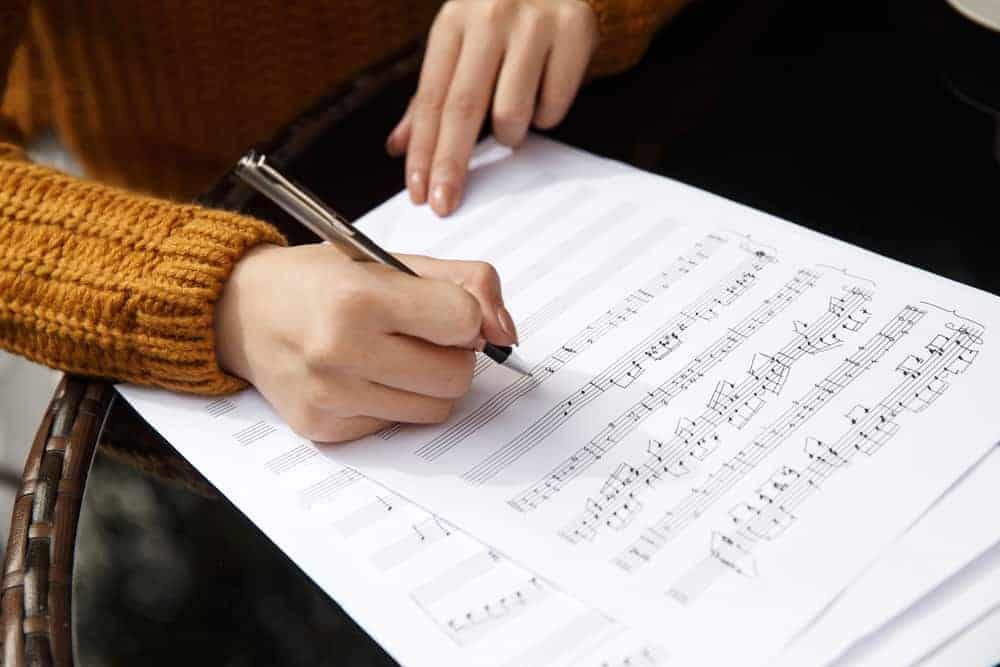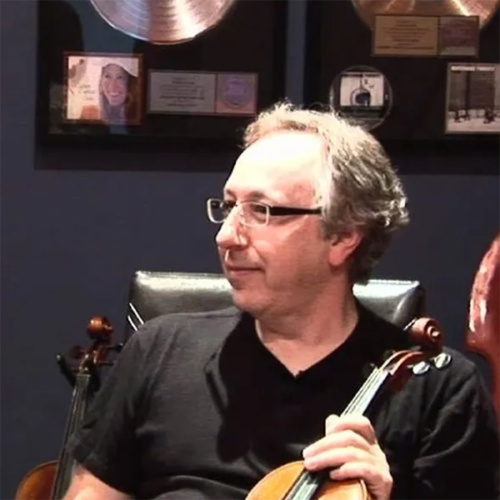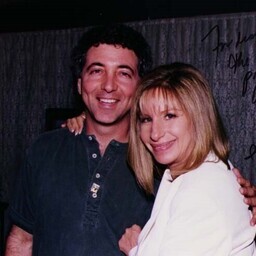Music Career Finder
Survey Start
Arranger
Career Overview
An Arranger reworks an existing musical composition for a live performance or studio recording, adapting the instrumentation, vocals, and harmonic, rhythmic, and melodic elements to create a new version of a song or musical composition.
Alternate Titles
Market Adapter, Transcriber, Music Arranger
Avg. Salary
$54,4001
Salary Range
$40K-$60K1

How To Become an Arranger
- Career Description
- Salary
- Career Outlook
- Career Path
- Experience & Skills
- Education & Training
- Additional Resources
- Sources
- References
Career Description
Arrangers write original new adaptations of existing pieces. An Arranger reworks and adapts existing compositions by changing instrumentation, adding orchestration, and changing harmony, tempo, and musical style or genre. Arrangers are employed in the live music and recording industry, as well as in film, musical theater, radio, and TV. Arrangers are sometimes also called Music Arrangers.
An Arranger might write string or horn parts to be added to a pop song written by another artist. Most arrangements will keep the melody, lyrics, and structure of the original piece so that they can be easily recognized, while reworking the song or composition by restructuring certain musical elements, adding new harmonies, or paraphrasing different sections. They take an existing melody and provide variation by adding to or detracting from parts of the music.
Many Arrangers are also Bandleaders, Musical Directors, Orchestrators, Conductors, performers, and Record Producers. They may work as specialists in music preparation or as music proofreaders. It’s common to see musicians working in various segments of the music industry using their skills as Music Arrangers.
Arrangers have a lot of creative freedom to express themselves in writing arrangements. They might decide to use new chords to support the melody, increase or minimize the instrumentation, adapt for a completely different style or instrumental setting, change the tempo or meter, change the key, add a new intro or ending, or add vocal harmonies. An Arranger can have as much influence on the final version or a piece as the original Songwriter, Composer, or Producer.
To learn more about what it’s like to work as an Arranger, we spoke to:
- Stevie Blacke (Dua Lipa, Rihanna, Lady Gaga)
- Carl Marsh (Eminem, John Prine, Etta James)
- Randy Waldman (Barbra Streisand, Beyonce, Frank Sinatra)
Salary
Arrangers work almost exclusively on a freelance basis. Their pay can fluctuate based on each project’s budget and the scope of work. Some Arrangers charge a flat fee for each song or for a completed project, or they might charge by the written page or even by the hour. There are a few salaried positions, for example, working for a TV show or recording studio, but these positions are usually combined with other roles such as Bandleader, Music Director, or Producer.
Being able to arrange music is a helpful skill for anyone making their living in any area of the music industry. Musicians with top-notch arranging skills have more opportunities to earn additional money as part of their day-to-day duties. While there are a few people who mainly specialize in arranging music, usually Arrangers also fulfill other roles as independent musicians which are supported by their arranging skills. This can lead to higher earnings than reported for just arranging music.
The average annual salary for an Arranger is approximately $54,400. The salary range for Arrangers runs from $40,000 to $60,000. Starting out, one is likely to earn below this range, while top Arrangers can earn much more, and some Arrangers also earn recurring royalties from their arrangements.
Hey, what do you think about trying our new Music Career HelperMusic Career Helper really quick? It’s totally free and could help get your career moving fast! Give it a try. It’s totally free and you have nothing to lose.
Career Outlook
Arrangers usually work for Producers, Composers, artists, and music publishing companies. Industry demand comes from the recording industry, music publishing, musical theater, live music, radio, film, and TV. Artists and Producers will always need Arrangers.
As with most music careers, it can take a lot of effort and time to get a foot in the door and work your way up.
Because arranging is often a freelance job, work is found through word of mouth. Having a strong professional network of relationships with musicians, Composers, and Producers is a key to success. It’s also important to build and maintain an updated portfolio of quality work to show to prospective clients.
Once an Arranger has built the connections they need so clients will think of them when they need arrangements, finding work should come naturally. Be aware that work hours will vary based on the project, who the Arranger is working with, and any deadlines involved.
Career Path
As in every creative field, there’s more than one possible path to becoming an Arranger. Arrangers end up making their living in many ways. They might be a Bandleader creating new arrangements for their ensemble to perform, or a Music Director adapting songs for stage or film musicals. They might work for a film or TV studio writing new arrangements of popular songs so studios don’t get stuck paying a lot of money for the rights to existing recordings.
Arrangers might also work as Conductors, Orchestrators, Music Directors, instrumental or vocal performers, Event Managers, and Record Producers. Working in the greater community of musicians and in music-related roles helps aspiring Arrangers to network and collaborate to enhance their likelihood of success.
Going to music school can also lead to relationships that could potentially boost future professional success, especially if the school is in a major urban area with a music industry presence. New York City, Los Angeles, and Nashville are considered primary music industry centers, but there are others, such as Atlanta, Miami, Chicago, Austin, TX, and others, including overseas. It’s probably important to be in a large city where there’s enough work to keep an Arranger busy.
Like many careers in the music industry, advancement for Arrangers comes in the form of working with more well-known artists and Producers, with bigger budgets and more prestige. The musical know-how and industry connections that will help one prosper as an Arranger take time to build but are likely to pay off in terms of job satisfaction and increasing skill level and accomplishments.
Experience & Skills
Arrangers work in collaboration with many others in the music industry, sometimes as members of a team. They need to have a strong musical vision and enjoy working with everyone from Composers and Songwriters to Producers, performers, technical people (like stage crews and Recording Engineers), and performers to bring the musical vision for a piece to life. As is the case for all musicians, professional networking skills are a must for Arrangers.
In addition to strong interpersonal skills, Arrangers should be great at verbal communication and have impressive leadership abilities. They need a complete understanding of music theory and should be able to read and write music quickly and easily. They should also be able to transcribe and orchestrate music and know how to conduct musicians in groups large and small.
Arrangers must have a deep and thorough understanding of a variety of musical styles. They should be able to use Digital Audio Workstations (DAWs) and know how to access music and software libraries and collections. They should be able to play an instrument well, and able to sing rhythms and melodies reading from the page. They should understand how harmony, melody, and rhythm work together to create beautiful music in all kinds of musical settings.
Arrangers use compositional techniques such writing new thematic material for introductions, endings, transition, and modulations. They can take an existing melody and provide musical variety by changing the instrumentation, tempo, rhythmic feel, and harmonic setting. They need to gain mastery with the entire musical lexicon, using it in new and fresh ways to create something completely new from an existing song or composition. This requires a certain amount of technique, talent, skill, and artistry.
Arrangers must be organized, as well as creative. They need to be able to figure out which instruments in the musical ensemble will play which parts, write those arrangements, and sometimes even perform themselves. Attaining the experience and skills necessary to become a skilled Arranger is a process that takes place over the course of many years.
Education & Training
Most (if not all) Arrangers complete some program of formal music training to learn the skills needed to be successful in a competitive music industry environment. This might include earning a college degree or diploma from a university or conservatory program. They could major in commercial music or in (song)writing and production. There are even arranging majors and minors offered at some schools, and master’s degrees in music writing and production.
As undergraduates, future Arrangers take all the core music studies, such as harmony (music theory), ear-training (solfege), music notation, and take arranging classes. They take classes in stylistic analysis, scoring, manuscript, and music technology. They also take private lessons on their principal instrument, take basic keyboard classes (if not a piano principal), and can participate in numerous ensembles, jazz combos, orchestra, chorus, and chamber groups. They may have the opportunity to write for the groups they perform or sing in.
One important advantage of being in music school is that there are many chances to have student arrangements played by groups of live musicians. This might be difficult to achieve outside of school. It’s very important for the student who is learning the art of arranging to hear their arrangements played by live musicians. It should be stressed that hearing one’s music played is a crucial aspect of learning to arrange for musicians.
The musical education and networking possibilities provided by a college education can be extremely useful for aspiring Arrangers. It’s most important early on to become well-versed in the fundamentals of music and gain an intimate understanding of how it’s put together. College is one of the best places to learn how to arrange and to make connections that can benefit your future music career. Being around lots of musicians will afford opportunities to arrange music for others and get a good start as an Arranger.
Other than attending a good school, an aspiring Arranger could choose to study privately with a professional Arranger who also teaches. There are specialized Teachers for arranging, just like there are for other aspects of music. Finding a good private Teacher could also lead to professional opportunities if the Teacher is willing to hand off some clients they can’t service.
Studying in a music program for college is probably the best way to break into the field of arranging. Having a website with a good portfolio of works, and a business card you can pass out at concerts and other places musicians gather is another way to find work when starting out. There might even be a chance to do an internship with a Composer, Songwriter, studio, or artist.
Eventually, word of mouth should do its magic and you will have no shortage of clients asking you to arrange music for them. You can also take pride in your work and your creativity, whether arranging music for your own group or for other artists and groups.
Additional Resources
Although there is no union for Arrangers, as has been noted, many Arrangers belong to the American Federation of Musicians.
Marsh believes college is one of the best places to make connections that can benefit your musical career. He says, “If you’re in college, it helps to be around Commercial Music majors; people who might end up needing some kind of arrangement at some point in time. That’s a decent springboard for getting to exercise your arranging chops early on.
“It also helps to go to a college that’s close to a thriving music community. In Nashville, there’s a college called Belmont College that has a fabulous Commercial Music program and music school.
Because all the Professors work in recording and work on Music Row, when they see a prospective standout student, they focus on that person so it becomes easier for that person to work their way into the industry. That’s actually one really good way of doing it. Otherwise, it’s difficult.
There are no real organizations for young people to network and get into arranging. NARAS (The National Academy for Recording Arts and Sciences) can be expensive. You have to go to lots of concerts that are of the type of music you want to arrange, introduce yourself and network with those people. Find a way to slide backstage and introduce yourself and give out cards; that’s about the only way if they don’t go the college route.”
Sources

Carl Marsh
Carl Marsh is a Grammy-nominated Arranger, Composer, Orchestrator and Conductor. Early in his career, he performed as a classical bassoonist and as a vocalist in a band signed by Clive Davis. He regularly works with the Portara Ensemble.
Over the course of his three decades in the music business, Marsh has written arrangements for Big Star, John Prine, Millie Jackson, The Bar-Kays, Etta James, Trisha Yearwood, Emmylou Harris, Shania Twain, Keith Urban, Garth Brooks, Art Garfunkel, Amy Grant, Kelly Rowland, James Otto, and many others.
His pioneering work with cult rock band Big Star has received nods from Vice, The New York Times, Stereogum, Consequence of Sound, and Brooklyn Vegan.

Stevie Blacke
Stevie Blacke is having an illustrious career as a String Arranger and “one man orchestra.” He works with some of the world’s biggest stars and best musicians. He’s played on dozens of top ten hits and hundreds of albums. Artists such as P!nk, Timbaland feat. Elton John, Dua Lipa, Kylie Minogue, Beck, Gary Clark Jr, Avenged Sevenfold, Alice in Chains, Colbie Callait, Lady Gaga, Snoop Dogg, Garbage, Foreigner, Cher, Rihanna, and Joe Cocker have all taken advantage of Stevie’s talents. Steve Vai raved “He has the most diverse and impressive resume I’ve ever seen.”
Stevie has arranged, contracted, and appeared on TV and film with artists such as Miley Cyrus, Ke$ha, Shawn Mendez, Dua Lipa, Kylie Minogue, Snoop Dogg with Chingy & Ludacris, P!nk, Mark Ronson, and Seal to name a few. He has appeared on MTV Unplugged, The Tonight Show, SNL, Jimmy Kimmel, numerous awards shows, and in a few movies as well including Popstar and All Nighter.
Recently Stevie has been writing with and producing new artists for his Flagship Artists record label. He has taken time with each artist to develop and help them each find and create their own unique sound. It’s given him a creative outlet to explore more writing as well as playing bass, guitars, and his otherworldly instruments such as Esraj and Mandocello.

Randy Waldman
Randy Waldman was born in Chicago, Illinois on September 8, 1955. He is an American Pianist, Arranger, Composer, Conductor, and Producer. He began playing piano at age five, at which time he was considered a child prodigy. He was hired to demonstrate pianos at a local music store at age 12. While in high school, he performed with the Northwestern University Jazz band. In 2019, Waldman’s arrangement of the “Spiderman Theme” on his Superheroes album garnered the Grammy Award for Best Arrangement, Instrumental, and Vocals at the 61st Grammy Awards. Waldman also co-arranged Barbra Streisand’s “Somewhere,” which was awarded with an arrangement Grammy in 1985.
He has served as Streisand’s Pianist and Conductor for over 35 years and has worked with numerous artists including Frank Sinatra, Michael Jackson, Whitney Houston, Beyoncé, Ray Charles, and Stevie Wonder. He is also a Helicopter and Airplane Pilot and Instructor and holds a 2003 flight speed record in a Bell OH-58 helicopter.
Career
At the age of 21, Waldman was hired to go on tour as the Pianist for Frank Sinatra. He was then hired by The Lettermen to go on tour from Chicago to Los Angeles. After the tour, Waldman relocated to Los Angeles and, within a year, he toured with Minnie Riperton, Lou Rawls, Paul Anka, and George Benson, the last of whom kept Waldman around as his Pianist, Musical Director, and Arranger for the following seven years.
Eventually, Waldman began a session career in Los Angeles that would go on to span 40 years. He has performed on hundreds of albums, motion picture soundtracks, television shows, and jingles. In the 1980s, Waldman worked on soundtracks such as Ghostbusters, Romancing the Stone, Back to the Future, Nuts, Beetlejuice, Salsa, Who Framed Roger Rabbit, The Abyss, and Weekend at Bernie’s.
In 1983, Waldman was nominated for a Grammy for Best Vocal Arrangement for The Manhattan Transfer’s “Code of Ethics”, from their album Bodies and Souls. Two years later, Waldman’s co-arrangement of the West Side Story song “Somewhere”, on Barbra Streisand’s The Broadway Album, won a Grammy. Waldman has been Streisand’s Pianist for over 35 years and is featured on many of her albums, movies, and live performances.
In the 1990s, Waldman worked on the soundtracks for numerous films including Forrest Gump, The Bodyguard, Mission: Impossible, and Titanic. He also worked with numerous artists over the course of his career including Barbra Streisand, Michael Jackson, Paul McCartney, Patti LaBelle, Celine Dion, Beyoncé, Madonna, Whitney Houston, Olivia Newton-John, Barry Manilow, Ray Charles, The Stylistics, Michael Bublé, Quincy Jones, Johnny Mathis, Stevie Wonder, Andrea Bocelli, John Travolta, Kenny G, Katey Sagal, and others.
In 1998, Waldman released his first solo album, Wigged Out, on his own WhirlyBird Records, featuring Bassist John Pattitucci and Drummer Vinnie Colaiuta. The album consisted of a collection of classical songs reworked with jazz arrangements. His second album, UnReel, was released in 2001 and featured a variety of themes from different films and television shows. In 2002, he worked on the soundtrack for Ice Age before releasing a third album, Timing is Everything, in 2003.
In 2017, Waldman appeared on Seal’s Standards album which features Frank Sinatra’s songs. He was also Barbra Streisand’s Pianist, Music Director, and Conductor for her Barbra: The Music, The Mem’ries, The Magic tour. A filmed version of one of the shows was released on Netflix in November 2017.
In September 2018, Waldman released the studio album, Superheroes, with Vinnie Colaiuta on drums and Carlitos Del Puerto on bass, featuring guest appearances from artists Chick Corea, Wynton Marsalis, George Benson, Take 6, Chris Potter, Steve Gadd, Till Bronner, Eddie Daniels, Randy Brecker, Joe Lovano, Arturo Sandoval, Bob McChesney, James Brolin, Michael Buble’, Jeff Goldblum, Josh Groban, Olivia Newton-John, John Travolta and several others. Waldman’s arrangement of the album’s “Spiderman Theme” would go on to win the Grammy Award for Best Arrangement, Instrumental, and Vocals at the 61st Grammy Awards in 2019. His arrangement of the “Batman Theme” was also nominated for the Grammy Award for Best Arrangement, Instrumental, or A Cappella.
References
- 1Multiple. "Salary for Music Composers and Arrangers". Recruiter. published: . retrieved on: Dec 16, 2019
- 2Multiple. "Salary for Music Composers and Arrangers". Recruiter. published: . retrieved on: Dec 16, 2019